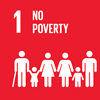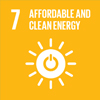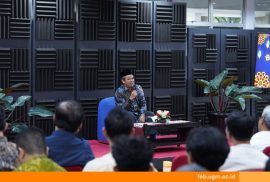
Micro, Small, and Medium Enterprises (MSMEs), which have long supported more than half of Indonesia’s economy, still face significant challenges in transitioning toward environmentally friendly and sustainable business practices. A study conducted by the Entrepreneurship, Innovation, and MSME Study Group of the Faculty of Economics and Business, Universitas Gadjah Mada (FEB UGM) in collaboration with Bank Indonesia shows that the majority of MSMEs have not adopted green business practices due to regulatory barriers, lack of green financing infrastructure, high investment costs, and limited incentives.
“87.81% of MSMEs in Indonesia have not adopted green or environmentally friendly business practices. Meanwhile, the remaining 12.19% have adopted green business practices but not comprehensively,” explained Widya Paramita, Ph.D., a researcher in the Entrepreneurship, Innovation, and MSME Study Group of FEB UGM.
Despite regulations governing green financing, Mita revealed that no green financing products currently target green MSMEs in Indonesia. Such regulations include Law No. 6 of 2023 Article 109 concerning corporate commitments to sustainable development through Corporate Social Responsibility (CSR), Law No. 4 of 2023 on the Development and Strengthening of the Financial Sector (UU P2SK) Articles 35A and 35B, Presidential Regulation No. 98 of 2021 on the Implementation of Carbon Economic Value to Achieve Nationally Determined Contribution Targets and Control of Greenhouse Gas Emissions in National Development (Perpres 98/2021), Presidential Regulation No. 59 of 2017 on the Implementation of Sustainable Development Goals (Perpres 59/2017), and Financial Services Authority (OJK) Regulation No. 51/POJK.03/2017 on the Implementation of Sustainable Finance for Financial Services Institutions, Issuers, and Public Companies.
“So far, financial and non-financial institutions have yet to implement green financing for MSMEs due to ambiguities and obstacles in applying these regulations,” she explained.
Mita outlined several challenges MSMEs face in implementing green financing, including the complexity of green financing requirements and green MSME criteria; limited green financing infrastructure and incentives for green practices; difficulties in attracting investors; and the gap in loan risk perceptions between MSMEs and financial institutions. Other challenges include the limited “green” knowledge on the supply side among green financing providers; the lack of awareness, understanding, capacity, and capability among MSMEs to adopt green practices; and difficulties in obtaining green certification for MSMEs transitioning to green business practices.
Furthermore, from the demand side, the green financing needs of MSMEs across different categories are relatively similar. These needs include financing for equipment and technology acquisition, access to markets interested in green products and market share expansion, human resource capacity building, and marketing for green business practices.
“The differences lie in the need for green certification for eco-entrepreneur MSMEs, and the procurement of green product raw materials and access to domestic and international markets for eco-innovator MSMEs,” she elaborated.
Mita noted that implementing green business practices requires high capital investment. However, such an investment will not yield benefits in the short term due to low market demand for green products. Meanwhile, MSMEs have limited capital capacity and require short-term returns to keep their business operations running.
Providing incentives for adopting green practices and green financing is a hopeful solution for MSMEs to accelerate the implementation of green business practices. Some possible incentives include offering lower interest rates than non-green loans, such as the People’s Business Credit (KUR) scheme. Meanwhile, various non-credit initiatives supporting green practices among MSMEs are already available. These include grant funding and MSME mentoring programs for implementing green practices. Companies often carry out such initiatives through CSR programs dedicated to promoting green practices among MSMEs, including the Young Entrepreneur and Womenpreneur programs that provide grant rewards and mentoring through regularly held competitions, the Hyundai Startup Challenge which awards funds as stimulus to competition winners, and BNI’s BUMI program which also offers funding and mentoring through competitions for MSMEs adopting green practices.
Mita stated that non-credit initiatives providing both funding and mentoring are highly beneficial for MSMEs in adopting green practices in their operations. These initiatives help fill the gap left by the absence of green financing products, serving as an alternative program to support sustainability in the MSME context.
Mita explained that a series of strategic steps is needed to encourage MSMEs to participate in green business activities. First, MSMEs need comprehensive mentoring in production, finance, and marketing. “In the short term, mentoring is necessary to help MSMEs that have not adopted green business practices quickly transform,” she said.
She added that green financing should prioritize the manufacturing and trade sectors. Additionally, she said that support for MSMEs in obtaining green certification must increase. In terms of collaboration, greater cooperation among the government, financial institutions, and academia is needed. This synergy is essential to ensure MSMEs receive the proper guidance in accessing green financing.
“The variety of green financing schemes also needs to be expanded and tailored to the needs of MSMEs,” she added.
Mita emphasized that broader dissemination of information on the availability of green financing, mentoring, subsidies, and incentives is necessary to encourage participation from MSMEs and financial institutions in the green financing market. Equally important is strengthening the role of supporting institutions such as aggregators, accelerators, and incubators by integrating their programs with green financing schemes. “We also recommend that the role of Bank Indonesia in fostering MSMEs continue to be enhanced, so that MSMEs are better prepared to enter the green financing market,” she concluded.
The study’s results were disseminated during the National Seminar on Green Economic Finance, which took place at the Jakarta Convention Center as part of the 2025 Karya Kreatif Indonesia (KKI) series, an event organized by Bank Indonesia. At the Jakarta Convention Center, the seminar carried the theme “Strengthening Green Financing Synergy to Support a Sustainable Economic Transition” on Friday, August 8, 2025. The event featured several speakers, including Destry Damayanti, Senior Deputy Governor of BI; Nita Anastuti, Head of the Inclusive and Green Economy Department; Alexandra Askandar, Deputy President Director of BNI; and Kurniawan Agung W, Head of GEKH. FEB UGM, represented by Widya Paramita, Ph.D., one of the researchers from the Entrepreneurship, Innovation, and MSME Study Group, presented the findings on the green financing ecosystem and recommendations for strengthening green financing policies.
The research team conducted the study in 2024, surveying 631 MSMEs in Indonesia from the agriculture, trade, and manufacturing sectors.
Reportage: Kurnia Ekaptiningrum
Sustainable Development Goals















